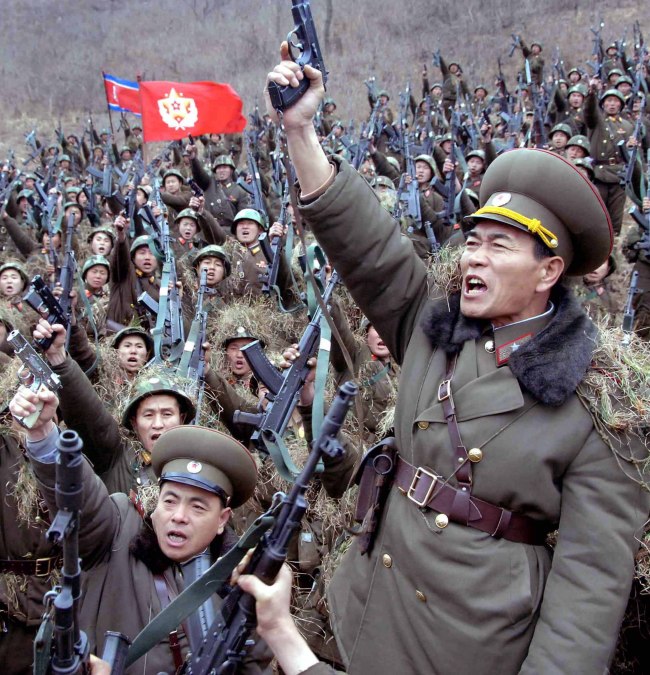The North Korean army on Thursday threatened a possible strike against U.S. military bases in Japan, in response to the use of nuclear-armed US B-52 bombers in joint military drills with South Korea.
The threat came a day after Pyongyang condemned the B-52 flights as an “unpardonable provocation” and threatened military action if they continue.
The Pentagon confirmed that B-52s, taking off from Andersen Air Force base in Guam, had flown over South Korea as part of annual joint exercises that Pyongyang insist are a rehearsal for provocation.
“We cannot tolerate the U.S. carrying out nuclear strike drills, setting us as targets, and advertising them as strong warning messages,” a spokesman for the North’s supreme army command said.
The threat came a day after Pyongyang condemned the B-52 flights as an “unpardonable provocation” and threatened military action if they continue.
The Pentagon confirmed that B-52s, taking off from Andersen Air Force base in Guam, had flown over South Korea as part of annual joint exercises that Pyongyang insist are a rehearsal for provocation.
“We cannot tolerate the U.S. carrying out nuclear strike drills, setting us as targets, and advertising them as strong warning messages,” a spokesman for the North’s supreme army command said.

“The U.S. should not forget that the Anderson base ... as well as naval bases at Japan’s main island and Okinawa, are all within the range of our precision target assets,” he said in a statement carried by the Korean Central News Agency.
Military tensions on the Korean Peninsula are at their highest level in years, with North Korea ― angered by UN sanctions imposed after its nuclear test last month ― threatening a second Korean War backed by nuclear weapons.
B-52s have taken part in South Korea-U.S. joint exercises before, but the Pentagon said it had publicized their use this time to underline U.S. commitment to defending its South Korean ally.
“As the U.S. has started naked nuclear blackmail, we will move on to corresponding military actions,” the North’s army spokesman warned without elaborating.
Korean Central Television issued an air raid alert at 9:30 a.m. and ordered military personnel and civilians to take cover. It added authorities called on the armed forces to take swift countermeasures to reduce damage before officially sounding the alert at 10:30 a.m.
The broadcaster did not say if an attack is under way or expected, a clear indication that it was a drill. The North had carried out similar annual air raid drills in the 1990s, and ordered blackouts during nighttime exercises.
South Korea’s military confirmed the North had carried out a drill.
“The drill may be in response to the earlier deployment of a U.S. B-52 bomber over South Korea,” an officer at the Joint Chief of Staff said. He added that the alert is similar to civil defense air raid drills carried out by Seoul.
A Unification Ministry official, meanwhile, speculated that the drill may have been aimed at raising public awareness of tensions on the Korean Peninsula caused by the Feb. 12 detonation of a nuclear device by the North.
He also said that the North carried out air alert exercises, although it is rare for them to be announced on the radio.
“In the past they used the nationwide cable broadcasting link to issue such alerts,” he said.
He stressed that it is time for the North to give up any plans and resist the temptation to commit further provocations. Instead, the communist country should make the right choice to ease tensions.
“If the country makes the right choices, Seoul is ready to begin the bilateral trust building process,” he said.
The new Park Geun-hye administration that took office late last month has embraced a “trustpolitik” doctrine to normalize inter-Korean relations that have been rocked by uncertainties in the past.
The doctrine calls for the building of mutual respect by keeping all promises to create more stable relations. Such developments can spur greater economic cooperation between the two Koreas and benefit all sides.
(From news reports)
-
Articles by Korea Herald



















![[Today’s K-pop] Treasure to publish magazine for debut anniversary](http://res.heraldm.com/phpwas/restmb_idxmake.php?idx=642&simg=/content/image/2024/07/26/20240726050551_0.jpg&u=)